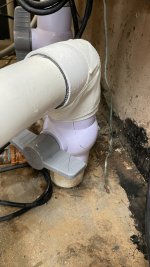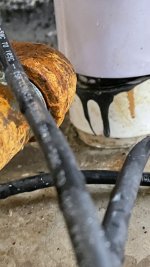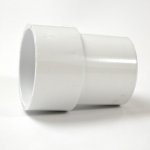My pool plumbing has a crack in the PVC elbow in the return line close to concrete in the equipment pad. I tried to patch it using the epoxy + fiberglass tape leak fixing kit from home depot, but I have a strong suspicion that it will leak when I pressure test it tomorrow.
Is there a way to fix it when don't have much length of pipe above concrete to cut and glue new fittings? In the attached picture, the elbow is cracked, and it's glued to the shut off valve beneath, which is just about 1 inch above the ground. Is there a way to remove a glued fitting or is there some other way to fix this?
Also, I see black glue used for the PVC fittings. What is this black PVC glue? I've seen black glue only used for ABS in the past. So, I'm trying to understand what type of glue was used by my pool contractor who installed these fittings.
Thank you!
Is there a way to fix it when don't have much length of pipe above concrete to cut and glue new fittings? In the attached picture, the elbow is cracked, and it's glued to the shut off valve beneath, which is just about 1 inch above the ground. Is there a way to remove a glued fitting or is there some other way to fix this?
Also, I see black glue used for the PVC fittings. What is this black PVC glue? I've seen black glue only used for ABS in the past. So, I'm trying to understand what type of glue was used by my pool contractor who installed these fittings.
Thank you!




